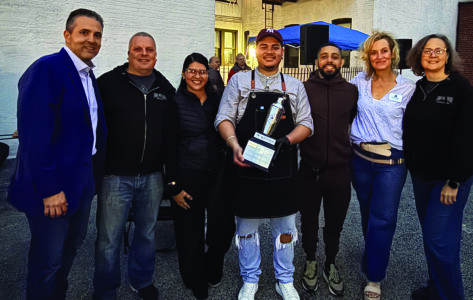When Jenny Chong left Malaysia 23 years ago, to set out for anew life in the United States, there was one word she knew wassynonymous with her destination — opportunity.
People from different countries, they have a dream to come tothis country, Chong explained. America is a fair country. If youwork hard, your dream will come true.
Two years ago, Chong accomplished her American dream, openingChiquita Mexican Grill on Fifth Avenue between 83rd and 84thStreets in Bay Ridge. And according to a study released last monthby the Brooklyn Chamber of Commerce, she belongs to a sizabledemographic within the borough: local business owners born outsidethe U.S.
According to the Spring 2011 Brooklyn Labor Market Review, halfof all self-employed workers of legally recognized businesses inthe borough are immigrants, compared to 44 percent of allself-employed workers in New York City. Additionally, Brooklyn’simmigrant entrepreneurs own a large majority of grocery stores (87percent), taxi and limousine services (81 percent) and restaurants(69 percent).
Carl Hum, president of the Brooklyn Chamber of Commerce, feelsthe numbers tell an interesting tale of the borough.
I think it says a lot of things about Brooklyn, Hum said. Itshows how much immigrants contribute to Brooklyn’s economy.Secondly, it shows Brooklyn is receptive to small businesses.Thirdly, it shows the diversity of the area.
But, how does someone from a foreign country decide to travelgreat distances and give up his or her former life to open abusiness in the U.S.? According to Fatima Abdullah, owner of S& J Grocery Store on 85th Street at Fifth Avenue, at least inregards to deciding what that business will be, the decision may bemade across cultural lines.
All of the grocery stores in New York – it’s Yemeni people [whorun] most of them, she said. You see, one person has fourbusinesses, five businesses, because he never did anythingelse.
But Abdullah, who emigrated from Yemen 25 years ago, alsobelieves that for many foreign-born entrepreneurs, particularlythose from her home country, opening a small grocery store is thequickest way to make a buck.
There’s a lot of ways to make money, but you grab the easy wayand a daily grocery store is the easy way, Abdullah explained.You’re sitting for 24 hours.
For Farook Karai, owner of 86th Street Deli & Grocery onFourth Avenue, buying a small grocery store is a new familytradition.
My cousin and everybody have a grocery, Karai said. Myson-in-law, same thing.
While Karai thinks the lifestyle of a store owner is far fromideal, he’s afraid he has few options for the future.
Again, I [return] to my country? he asked. I’m 53.
And although any business owner, foreign born or not runs therisk of having a similar sense of their limitations, according toChong, they should still go for it.
It’s an adventure when we open a restaurant, she said. Wedon’t know if we’ll win or lose, but if you want to do it, do it.That way you won’t have any regrets.

 On the Avenue: ‘Gin Merchant’ drink coming to a bar near you!
On the Avenue: ‘Gin Merchant’ drink coming to a bar near you!  On the Avenue: Community golfs ‘fore’ good cause
On the Avenue: Community golfs ‘fore’ good cause